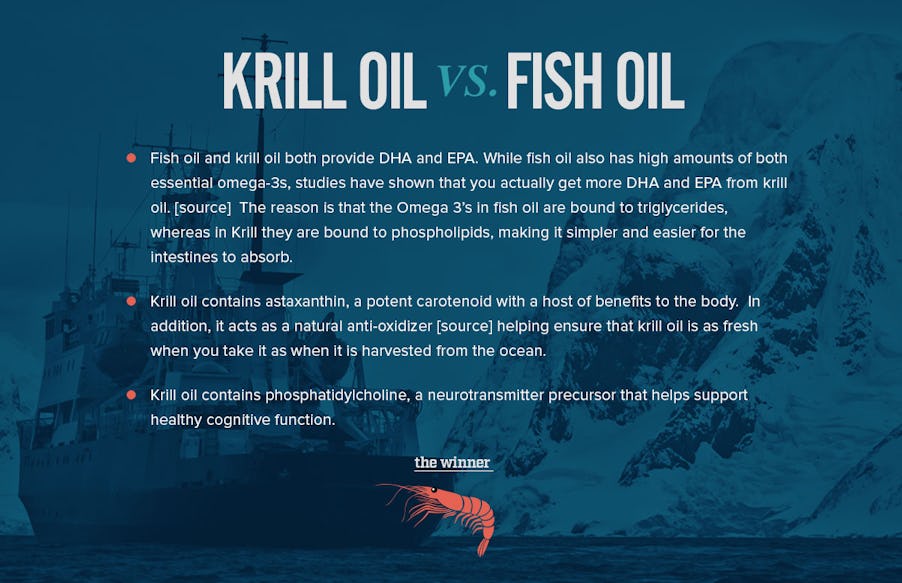On some level, you probably know you’re supposed to be incorporating one to two doses (about six to eight ounces) of fatty fish into your weekly diet.
You may even know the reason lies in the high levels of omega-3 fatty acids found in fish¦and that these omega-3s are somehow, some way, supposed to be good for you.
But knowing is a long way from doing, which begs the question: Are you one of the estimated 4 in 5 Americans who fail to consume enough fatty fish each month to meet the dietary guidelines for the omega-3 fatty acids docosahexaenoic acid (DHA) and eicosapentaenoic acid (EPA)?
Based on probability alone, I’d wager a confident “yes,” which I’ll follow with a, “If you’re not consuming enough fatty fish, you need a stand-in supplement.”
Fish oil capsules have long been the go-to option for enjoying the benefits of fatty fish without, well, eating fatty fish, but over the last few years, krill oil has made a name for itself as a potential omega-3 powerhouse.
So how do you know which supplement is best? Read on, my friends, read on. When it comes to krill oil vs. fish oil, this is what you need to know.
Krill Oil vs Fish Oil: The Basics

It shouldn’t take a rocket scientist to determine that fish oil is oil that comes from fish, and krill oil is oil that comes from krill, but what the eff is krill, and what type of fish does fish oil come from?
Both are good questions.
â What is krill? Krill are tiny crustaceans, a bit like shrimp but smaller, at just one to six centimeters long. They’re plentiful in the ocean, with an estimated biomass of 379-million tons (a biomass significantly larger than humans’ estimated 100-million tons), and they’re a popular meal item for sea animals like whales, birds and other fish, placing them solidly at the bottom of the ocean’s food chain.
â What type of fish does fish oil come from? Fish oil, on the other hand, comes primarily from cold water oily fish, including salmon, herring, mackerel, anchovies and sardines. These fish are higher up on the food chain, which means they sometimes contain high levels of mercury and other toxins.
â Do both provide omega-3s? Whether you take fish oil or krill oil, you’re going to enjoy a healthy dose of the omega-3 fatty acids DHA and EPA, although krill oil is gaining popularity due to its higher levels of EPA and its added antioxidant, astaxanthin, which gives krill oil its reddish color.
â What’s the research say? Fish oil has been studied extensively and appears to have many positive health benefits, ranging from improved cardiovascular function to suicide prevention. Krill oil also has studies backing its efficacy as a health-promoting supplement, but as a newer option on the market, there are fewer studies quantifying its benefits.
â What about fish burps? Fish oil is known for its unpleasant, post-consumption “fish burps,” which krill oil users appear to be able to avoid.
â What’s the difference in price? Krill oil supplements tend to be much more expensive than fish oil supplements. This is largely due to the way each supplement has to be processed to avoid rancidity. Krill begins decomposing and oxidizing much faster than fish oil, so to avoid decomposition prior to manufacturing, krill must be kept alive in tanks or frozen until processing can begin. This significantly increases the cost to companies producing krill oil. That cost is passed on to consumers.
Importance of Omega-3 Essential Fatty Acids
The whole point of eating fatty fish, or taking a krill oil or fish oil supplement, is to increase your intake of omega-3s. These essential fatty acids (EFAs) are long-chain, polyunsaturated fatty acids deemed “essential” because your body can’t make them on its own.
If you don’t regularly consume foods containing omega-3s, your body could undergo some serious repercussions.
You see, EFAs, including omega-3s and omega-6s, play a key role in just about everything your body does. For instance, they help form healthy cell membranes (which are kinda important throughout your body).
They play a role in hormone production, the function and development of the brain and nervous system, regulation of blood pressure and blood clotting, transportation of cholesterol, and the function of the liver.
Not to mention, due to EFAs’ role in healthy cells and hormones, they help your skin and hair look pretty, preventing premature aging.
If, for whatever reason, you aren’t consuming enough EFAs, or if your ratio of omega-6 fatty acids to omega-3 fatty acids is off-kilter (typically you’re supposed to eat a ratio of somewhere between 2:1 and 4:1 omega-6s to omega-3s, but most
Americans consume far more omega-6s than omega-3s), you open yourself up to a slew of potential health problems, including heart disease, cancer, diabetes, arthritis, dementia and depression.
So yeah, who cares if you don’t like fish? You need to find a way to consume those omega-3s!
Omega-3 fatty acids are essential dietary components that play a key role in development and maintenance in a variety of organ systems.
Fish oil contains eicosapentaenoic acid (EPA) and docosahexaenoic acid (DHA), two long-chain polyunsaturated fatty acids (PUFAs) that cannot be synthesized by humans.
A large body of research has revealed the enormous benefits of these fats, ranging from enhancing cognitive function to fighting obesity.
Recent research has focused on which source of fatty acids reigns as superior and the answer is clear: krill is king.
The Source
If you’ve never heard of krill, you might not be alone. However, at an estimated 600 million tons, the biomass of these shrimp-like crustaceans more than double the biomass of human beings.
The harvesting practices of krill for human consumption are tightly regulated and make a minimal impact on total krill population.
Comparatively, the use of krill as a nutrient source is more sustainable than other types of fish oil, such as cod or salmon.
Benefits of Supplementation
While it’s completely possible to consume enough omega-3 fatty acids in your normal diet by eating lots of fatty fish, walnuts, flax seeds, chia seeds and egg yolks, there are a few reasons why supplementation is a smart option:
â Most people aren’t consuming enough omega-3s in their diets. Fish just isn’t that popular, apparently, whether based on taste or cost. And even if you try to “make up for” your lack of fish consumption by going heavy on the walnuts and flax seeds, these plant-based omega-3s don’t convert into the important EPAs and DHAs found in marine-derived omega-3s. A high-quality supplement can provide the EPAs and DHAs your body needs, no fish food required.
â Fatty fish can contain high levels of mercury. While consuming one to two servings of fish each week is considered a healthy decision, you may not want to consume much more than that due to the potential for high levels of mercury and toxins. Krill doesn’t contain much (or any) of the toxins and metals found in fatty fish, and fish oil supplements are processed, removing potential toxins. This makes krill and fish oil supplements a safe option for daily consumption in lieu of, or in addition to, fatty fish.
â Supplementation provides a good “insurance” plan. Even if you eat fish regularly, it’s tough to know if you’re consuming enough omega-3s and attaining the correct ratio between omega-3 and omega-6 fatty acids. Taking a supplement can hedge your bets and keep you on the right track consistently.
Health Benefits of Krill Oil vs Fish Oil
Krill oil and fish oil each appear to offer many health-promoting benefits. That said, fish oil has been studied much more extensively, so it’s easier to definitively quantify its benefits.
â Heart health. Both types of oil appear to promote heart health, but fish oil’s depth of research unequivocally points to its powerhouse ability to protect your ticker. For instance, Examine.com, and independent organization that examines the available research on nutritional supplements, looked at more than 750 studies on fish oil and concluded there’s significant research to back fish oil’s benefits for lowering triglyceride levels, modestly lowering blood pressure, increasing healthy HDL cholesterol, modestly reducing inflammation and possibly contributing to a decrease in the negative LDL cholesterol. Examine.com also looked at krill oil, finding a comparably small 49 studies to investigate. Even so, the research available indicates that krill oil also increases healthy HDL cholesterol while reducing LDL cholesterol, triglycerides and even total cholesterol, making it a good option for cardiac health.
â Arthritis. Likewise, there’s research to back the use of both forms of oil when it comes to arthritis treatment. Fish oil, specifically, appears to lower inflammation and may also lower the presence of c-reactive protein, a blood test marker for inflammation in the body. Evidence for krill oil’s positive benefits are even more greater, although fewer studies have been done. For instance, Examine.com found a study that supported a significant decrease in c-reactive protein in individuals with rheumatoid arthritis, reducing arthritis symptoms by up to 30-percent within 30 days while taking a 500-miligram per day dose of krill oil.
â Depression. Fish oil, hands down, is the winner (so far) when it comes to improving mood and alleviating symptoms of depression. Whereas krill oil has had very limited studies that point to the supplement’s ability to modestly reduce irritability, stress and symptoms of PMS, the research simply isn’t there to conjecture further. Fish oil, however, has been studied and re-studied on the matter, and is considered comparable to pharmaceutical drugs in the treatment of severe depression. It also appears to decrease cortisol, the stress hormone, decrease symptoms of depression in bipolar individuals, and decrease aggression and anxiety.
â Brain health. Fish oil is a known nootropic – it’s able to improve and enhance neural function and cognition without negative side effects. And the research is significant – it points to fish oil’s ability to increase cerebral blood flow and oxygenation while boosting memory, processing accuracy and reaction time while decreasing cognitive decline. Given krill oil’s similar omega-3 makeup, it’s reasonable to assume it would have similar brain-boosting effects, but unfortunately the research is still too new to completely support the assumption.
Bioavailability of Krill Oil vs Fish Oil

One factor that really sets krill oil apart from fish oil is its bioavailability. According to a 2011 study published in the journal Lipids, study participants given krill oil or fish oil for seven weeks saw similar increases in plasma EPA and DHA levels compared to the control group.
What’s significant about this study is that the dosage of krill oil was 68-percent of that of fish oil. In other words, the omega-3 polyunsaturated fatty acids in krill oil were more bioavailable than those in fish oil, making it possible to take a lower dose with similar results.
It’s assumed the improved bioavailability of omega-3s from krill oil is due to the fact that they’re bound to phospholipids rather than triglycerides, making them easier for the body to digest, but this may or may not be the case.
One 2015 study published in Lipids in Health and Disease found that krill meal had similar bioavailability to fish oil, when adjusted for dosage, while krill oil offered superior bioavailability.
This argues against the phospholipid suggestion given that krill meal and krill oil had identical fat makeup, both being bound to phospholipids.
Both krill and fish oil contain EPA and DHA. However, the one key disparity is the content of phosphatidylcholine (PC) in krill oil.
The addition of a phosphate group to the fatty acid chain permits simpler digestion in the small intestine and a more rapid incorporation into brain, lung, and liver tissues.
When comparing the effects of the EPA bound to phosphatidylcholine/phosphatidylserine in krill oil as opposed to the EPA bound to triglycerides in fish oil this study demonstrates that krill is more bioavailable.
In the aforementioned study, humans that were given krill oil containing 62.8% of the total amount of omega-3s in fish oil, increased their plasma EPA and DHA levels to the same level as those in the fish oil group¦ despite that it was a smaller dose (by 37.2%).
The presence of phospholipids in krill oil are responsible for the increased absorption efficiency and may permit a more rapid incorporation into important tissue [source].
Ultimately, it doesn’t matter – the scientists can keep working out the details. The point is, krill oil is more bioavailable than fish oil, and that’s a good thing.
Astaxanthin Advantage
Krill also contains astaxanthin, the same antioxidant that is responsible for the red color of salmon meat [source].
Astaxanthin is a carotenoid, and carotenoids are antioxidants that sequester singlet oxygen. Singlet oxygen is very reactive and can damage lipid membranes, DNA, and proteins in your cells. All of these are fundamental biological causes of aging.
Astaxanthin helps to protect the fatty acid chains from degradation and has been shown to play an important role in reducing inflammation in the cardiovascular system [source].
In a small clinical trial, astaxanthin supplementation itself (e.g. not in combination with omega-3 from krill) was shown to improve immune function while decreasing inflammation (CRP) and lowering DNA damage.
Astaxanthin has also been shown to help increase HDL-cholesterol (which was recently shown to help the body strip plaque off of arterial walls) as well as decrease triglycerides in another clinical trial, suggesting it plays an important role in cardiovascular health.
Health & Cognition
Where does krill display its prowess in the world of supplements? The anti-inflammatory properties of krill oil have been shown to assist in healthy weight management by reducing low-density lipoproteins (LDL), commonly known as the harmful type of cholesterol [source].
The incorporation of krill oil can help the body promote weight loss, healthy blood pressure, and affect a reduction in inflammatory problems. Recent research suggests Krill Oil may have a profound effect on the brain, similar to fish oil.
One advantage it has in this area is that omega-3 fatty acids incorporated in phosphatidylcholine act on brain function more efficiently than those incorporated in triglycerides, which omega-3s are bound to in fish oil.
Since the omega-3 fatty acids are bound to phosphatidylcholine in krill oil, this implies that they will be taken up by the brain tissues more readily than triglyceride-bound omega-3 from fish oil.
This infers that it might be able to get positive effects at a lower dose, which is reinforced by the above study on bioavailability.
A clinical trial involving elderly men that supplemented with krill oil resulted in enhanced working memory function. In addition, the krill oil also caused a significant decrease in latency, which reflects the rate of information processing.
Supercharge Your Fatty Acids
The presence of PC in krill is one clear advantage over regular fish oil. However, either fish oil or krill can be combined with additional PC to enhance absorption and boost choline levels.
In randomized clinical trials, this combination has been shown to help reduce cortisol levels in individuals with stress [source]. Additional studies combining EPA, DHA, and PC showed elevated levels of attention, mood, and memory function [source, source].
Additional Nutrients in Krill Oil vs Fish Oil
Fish oil is fish oil. Period, end of story. Krill oil, on the other hand, is thought to reduce oxidation and inflammation. It also preserves the supplement’s potency, and has been shown to support eye health. There have been few human studies on astaxanthin, but experts believe it may be safer than beta-carotene.
Sustainability of Krill Oil vs Fish Oil
If you care at all about the environment and the state of the ocean’s fragile ecosystem, then krill oil is the only responsible choice you can make. The commercial fishing industry has fished out roughly 90-percent of the large fish species consumed by humans and used to make fish oil.
Not to mention, fishing quotas are consistently 15- to 30-percent higher than the scientist-recommended safe limits for environmental sustainability.
Krill, on the other hand, is practically bamboo-like in terms of its renewability. In fact, its reproduction rate can weigh in the several hundred million tons each year.
In 2008, the Commission for the Conservation of Antarctic Marine Living Resources (CCAMLR) set a precautionary catch limit of 5.6-million tons of krill. Amazingly, the actual annual catch is only about 0.3-percent of the unexploited biomass of krill.
In other words, there’s a lot of krill, it won’t be running out any time soon, and harvesting some of it won’t interfere with long-term availability that might disrupt the marine ecosystem.
Safety of Krill Oil vs Fish Oil
Both fish oil and krill oil are considered safe supplements, in terms of mercury, pesticides and other possible toxins that can accumulate inside fatty fish. But if you’re at all worried about what might be lurking inside your supplement, then krill oil is your better option.
Because krill are found in the deep, clean waters of the Antarctic, because they’re at the bottom of the food chain and eat primarily phytoplankton and zooplankton, and because they have a short lifespan, they simply don’t accumulate the heavy metals, pesticides and toxins that other fish that live farther up the food chain do.
Fish oil supplements are also unlikely to have much in the way of mercury or toxins due to the processing they undergo prior to sale, but they do run some risk of becoming rancid and useless, health-wise, because they lack the antioxidants found in krill oil supplements.
Takeaway

While fish oil is the tried-and-true supplement with years of research and support to back its heart-healthy reputation, it may only be a matter of time before krill oil reaches and surpasses fish oil’s popularity.
Krill oil’s similar omega-3 makeup and superior antioxidant level and bioavailability set it apart from fish oil, while its safety and sustainability make it the responsible choice.

)





